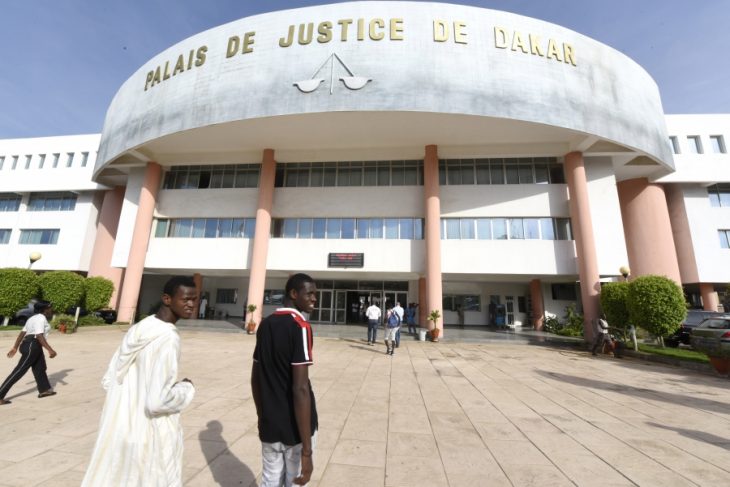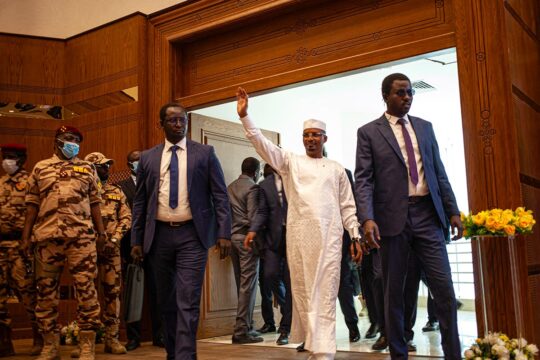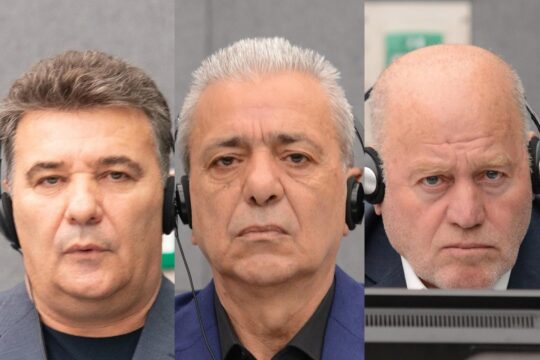Extraordinary African Chambers (EAC) Prosecutor Mbacké Fall on Wednesday asked the court to sentence former Chadian president Hissène Habré to life in jail and confiscate all his assets. Fall was speaking on the third day of closing arguments in the Dakar trial of Habré for war crimes, crimes against humanity and torture committed under his rule (1982-1990). The defence takes the stand on Thursday.
Prosecutor Fall recapped Habré’s rule at length, telling the court that his seizure of power in 1982 was accompanied by repression in the south of Chad.
“By September 6, 1982, the Armed Forces of the North (FAN) had conquered the whole of the south and started committing the worst atrocities,” he said.
He then spoke about the creation of the Directorate of Documentation and Security (DDS), Habré’s political police. “It was in the DDS’s places of death that the most human rights abuses were perpetrated,” Fall told the court. “They included torture, inhumane treatment, rape, summary executions, abducting and ‘disappearing’ people.” The Prosecutor said these “concentration camps” constituted the “first criminal act of Habré, who encouraged the various crimes of torture and other crimes against humanity”.
Habré’s defence team, which takes the stand on Thursday, said they were not surprised by Fall’s arguments. Court-assigned lawyer Mounir Balal said the prosecution had not managed to prove the guilt of the former president.
On February 4, Habré’s chosen defence team, who are boycotting the trial, said at a press conference that Prosecutor Fall was “the right-hand man” of current Chadian President Idriss Deby and Senegalese Justice Minister Sidiki Kaba, bent on “eliminating Habré physically and politically”. “We have been watching a shameful masquerade whose sole aim is to eliminate one man, to take away his freedom and his life,” declared French lawyer François Serres. The defence also denounces a procedure it says has excluded Idriss Déby from the beginning.
The Prosecutor’s closing arguments were preceded on Monday February 8 and Tuesday 9 by the arguments of lawyers for the civil parties. Their arguments all focussed on the individual criminal responsibility of the accused.
“This is a historic and emotional moment,” said Chadian lawyer Jacqueline Moudeina, “because it is the end of a long process. Hissène Habré had the power of life and death over his people for the eight years that he ruled Chad with an iron fist. The witnesses who have come to the stand are completely traumatized.”
Lawyer Yaré Fall said Habré’s responsibility was not in question, since it was he that had the prisoners executed. “As the overall boss, he did absolutely nothing to stop the killing, so he must take responsibility,” he said. The Senegalese lawyer also said Habré had “no consideration for the institutions of Senegal, the country that has hosted him since 1990. “When the judges enter everyone rises except him,” complained Yaré Fall.
Habré walled in silence
Chadian lawyer Lamina Djindammadji accused Habré, whom he compares to Hitler, of decimating the intellectuals of his country. “Under his rule, prisoners were piled into 12 square-metre cells,” he told the court. “Not only were they given bad food but they were denied access to health care and subjected to inhumane treatment.”
The former Chadian head of State remained walled in silence, surrounded by three guards.
“The rate at which people were dying in Chadian prisons is significantly higher than the worst rates of prisoner deaths recorded in the 20th century,” said Belgian lawyer Henry Beautier. He also quoted a survey saying that Habré’s victims over 90 months were equivalent to 300 people in 133 rooms, making a total of not less than 40,000 victims.
Beautier said rape, sexual slavery and prostitution were the lot of women in the prisons. This concurs with the testimony of Khadija Hassan Zidan who claimed to have been raped by Hissène Habré himself.
The victims of the Habré regime were not only Chadians, according to lawyer Assane Dioma Ndiaye. He evoked the case of Senegalese jeweller Demba Gaye who died in the prisons of N'Djamena. Ndiaye said there was evidence that the DDS answered directly to Habré.
French lawyer William Bourdon closed arguments for the civil parties, declaring that “the word dignity is not in the vocabulary of Hissene Habré, who soiled the very ground of Chad. He is beyond the norm. He is a criminal who outstrips them all, even Pinochet.” “This trial will allow the victims to regain a bit of their lost dignity,” Bourdon told the court. “We hope that your verdict will be the start of hope for humanity.”






